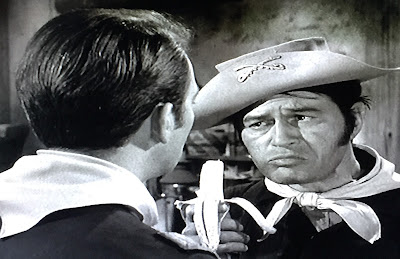
Why the Hell isn't this on DVD yet?--Number 99
POP ALWAYS PAYS (1940 RKO Radio Pictures) Starring Leon Errol, Dennis O'Keefe, Adele Pearce, Walter Catlett, Marjorie Gatesman, Robert Middlemass, Tom Kennedy, Effie Anderson, Erskine Sanford. Written by Charles E. Roberts. Directed by Leslie Goodwins.
Businessman Errol isn't wild about daughter Pearce's chosen mate, profligate O'Keefe. To stop them from marrying, Leon lays down the law: he won't approve of the wedding until O'Keefe has one thousand dollars in a savings account (approximately $17,600 in today's dollars). Underestimating the suitor's determination, "Pop" confidently offers to match the sum once O'Keefe reaches his goal.
As you might guess, ol' Rubberlegs soon regrets that decision. With Pearce's prodding, O'Keefe sells his overpriced car and frugally begins fattening his savings account. Meanwhile, Errol experiences a severe financial slump. Rejected for a bank loan and facing a forced merger with rival Middlemass, Leon resorts to a desperate measure--the attempted robbery of his own home.
Along with Edgar Kennedy, Errol was a go-to guy for RKO short subjects for two decades, and the prolific comedian also frequently headlined "B" movies for the studio. On its surface, POP ALWAYS PAYS appears to be a padded two-reeler sans the London Bridge theme song (sort of: Errol sings it briefly at once point). But look deeper, and fans of the flexibly limbed star will find several atypical elements this time around.
 |
| No, there's no vodka in it!!! |
While a change of pace, POP ALWAYS PAYS is still a decent display of the man's genius even without Leon's regular shtick, providing him plenty of opportunities for impeccably timed comic denials and double takes as he weaves an increasingly tangled web of deception. In another new wrinkle, it isn't Elisabeth Risdon or Dorothy Grainger playing Mrs. Errol this time. Marjorie Gateson does the honors instead, with chemistry strong enough to make you wish they'd worked together more often.
Next door neighbor Catlett manages a seemingly impossible task: stealing a scene from Errol. To be fair, Walter is playing a truly hilarious freeloader who doesn't even have a car and has been bumming rides from Errol for a decade. Catlett invites himself over for breakfast, "borrows" sugar and two cans of coffee, and takes full advantage of a household distraction by making off with Leon's pot roast and noodles dinner--all in the first 15 minutes. These two old pros went way back: Catlett teamed with Errol onstage in Ziegfield's SALLY (1924) and they later reunited for the RKO vehicles HAT CHECK HONEY (1944) and RIVERBOAT RHYTHM (1946).
 |
| Tom Kennedy |
 |
| O'Keefe and Pearce...at the time, anyway |
 |
| He won't have to kill that boy for another twenty years |
SO...WHY ISN'T THIS ON DVD?
There's plenty of "B" movies just over an hour long from the 1930's and 1940's that aren't out on home video, so this RKO quickie isn't unique.
WHY IT SHOULD BE ON DVD:
As mentioned, we need all the Leon Errol we can get on home video. His 98 RKO shorts (rarely aired these days) sadly lack a proper release, with only about a dozen available courtesy VCI. While we did get the MEXICAN SPITFIRE collection out a few years back from Warner Archive, that still leaves plenty of Leon's best in limbo.
Without the customary boozing and marital misunderstandings, POP ALWAYS PAYS avoids the repetition that plagued the Errol shorts from time to time. While no classic, it is a fun way to spend an hour. It aired on TCM in November and is worth DVR'ing if and when it returns.
The introduction to our Leon Errol Salute series is at this link.






























